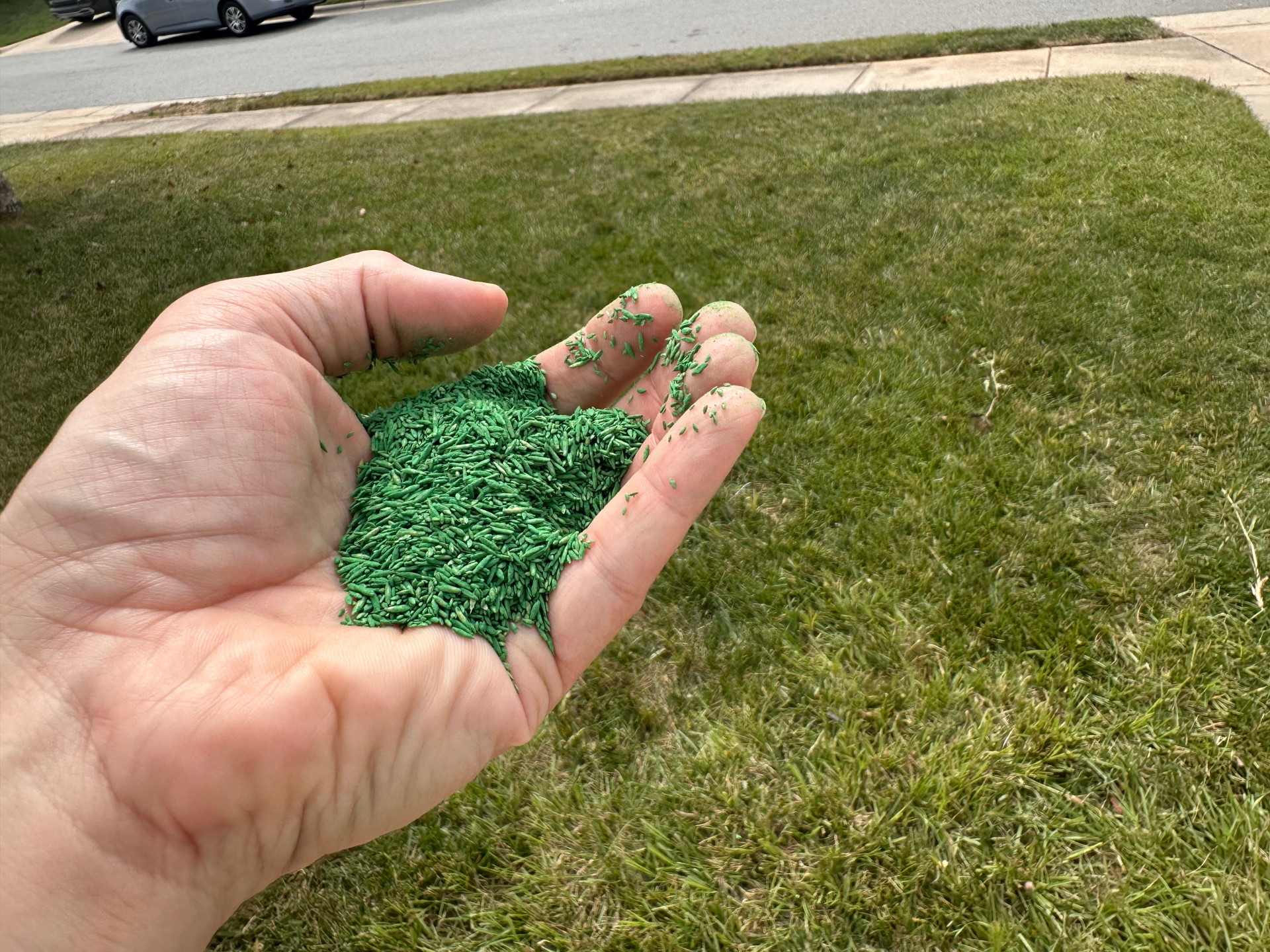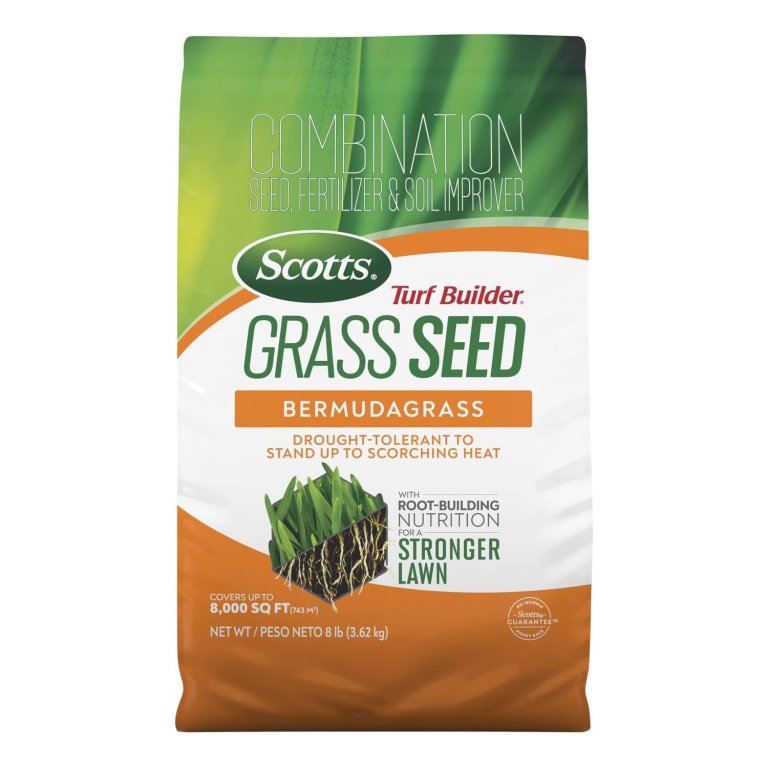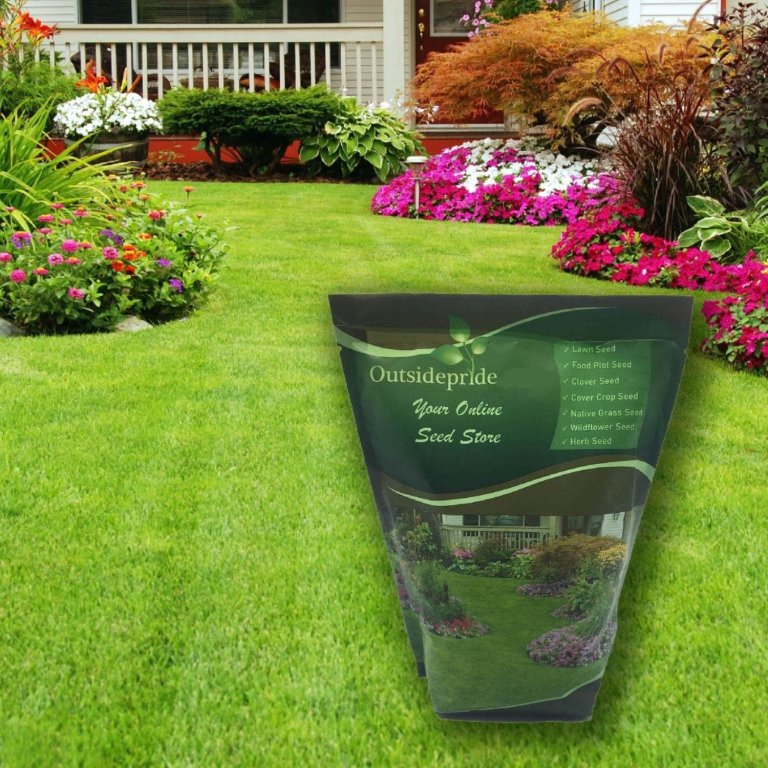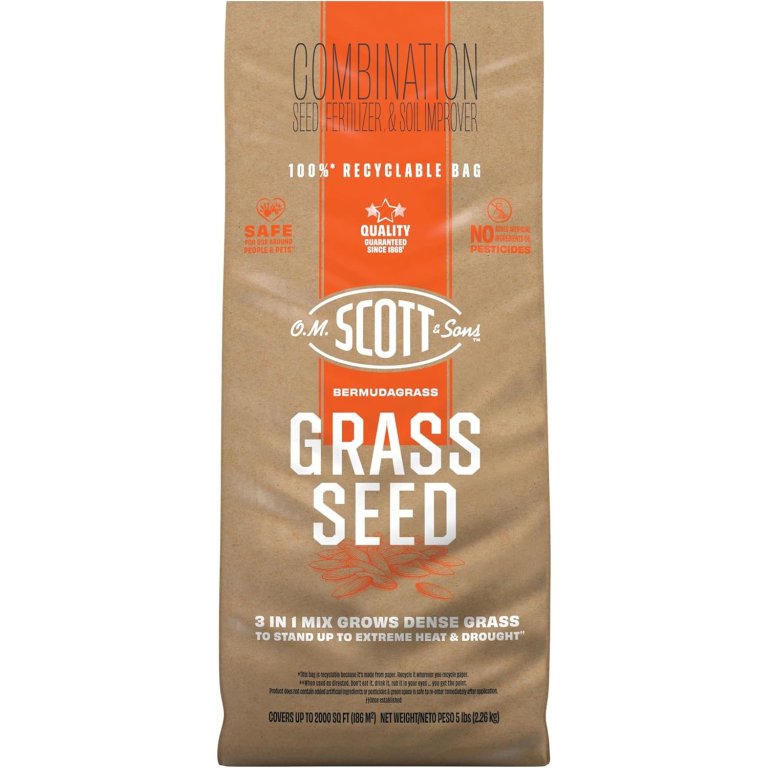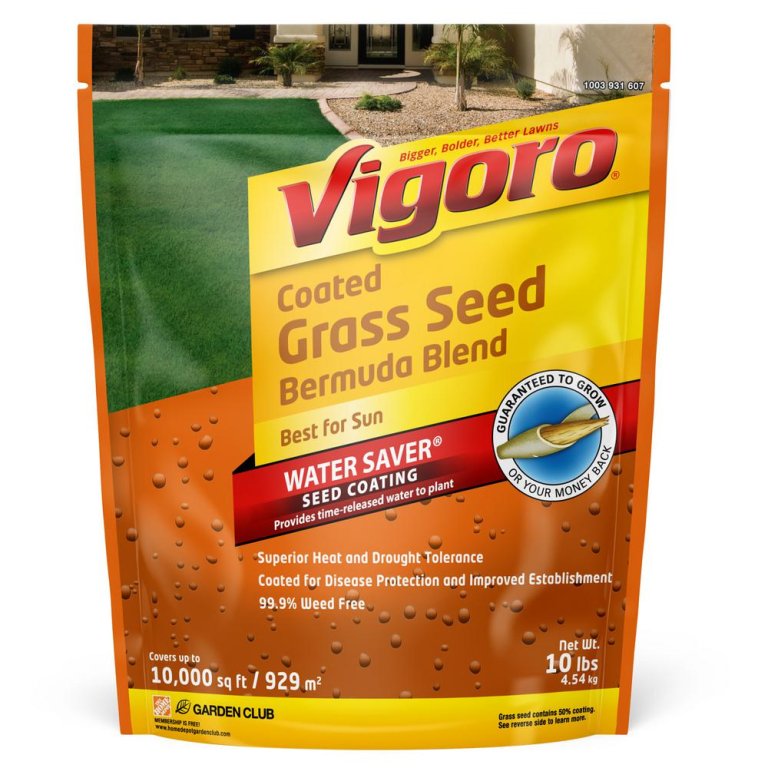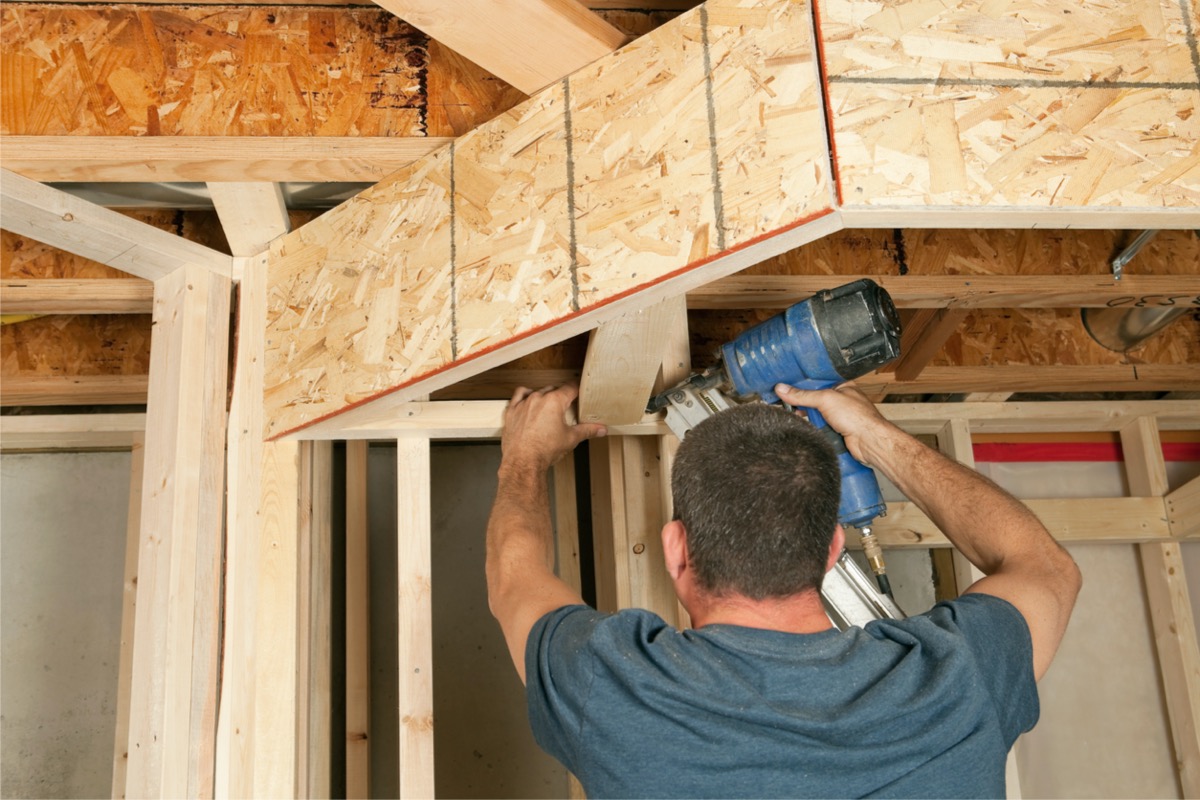We may earn revenue from the products available on this page and participate in affiliate programs. Learn More ›
Bermuda grass is a popular choice for turfgrass applications, and an abundant lawn starts with the right seed. It is resilient and forgiving, and in the right growing conditions, it can create a low-maintenance Bermuda grass is a popular choice for turfgrass applications, and an abundant lawn starts with the right seed. It is resilient and forgiving, and in the right growing conditions, it can create a low-maintenance, but thick and uniform lawn. These qualities make it a top choice for home lawns, golf courses, parks, and athletic fields. We tested three Bermuda grass seed varieties and found Scotts Turf Builder Bermuda Grass, with its high germination success rate and rapid growth, to be the best of the bunch. Along with our tested picks, we include two other highly regarded Bermuda lawn grass options.
With a wide variety of seed types available, choosing the right type for your lawn can feel overwhelming. Read on to learn more about the factors to consider when seeding new grass, and explore the best Bermuda grass seed options for a low-maintenance and beautiful lawn.
- BEST OVERALL: Scotts Turf Builder Grass Seed Bermudagrass
↓ Jump to Review - BEST HYBRID: Outsidepride Full House Bermuda Grass Seed Blend
↓ Jump to Review - BEST USER FRIENDLY:O.M. Scott & Sons Bermudagrass Grass Seed
↓ Jump to Review - BEST BANG FOR THE BUCK: Vigoro Bermuda Grass Seed Blend
↓ Jump to Review
Bermuda Grass Seed Comparison
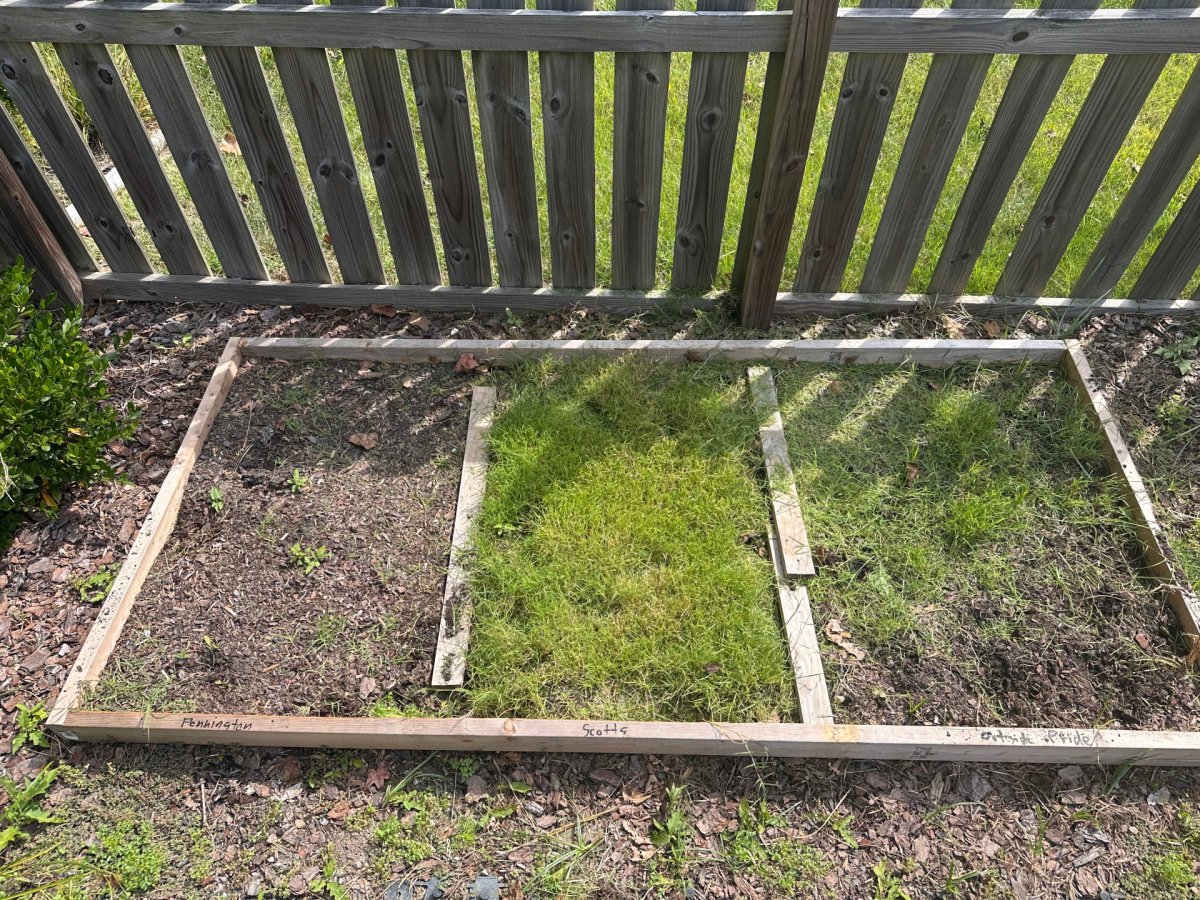
| Product | Type | Coverage area | Germination time |
| Scotts Turf Builder Grass Seed Bermudagrass | Seeded | 8 pounds of seed for 8,000 square feet for adding to existing lawn; 2,665 square feet for new lawn coverage | 5 to 12 days |
| Outsidepride Full House Bermuda Grass Seed Blend | Seeded hybrid | 1 pound for approximately 500 square feet for new lawn coverage | 7 to 14 days |
| O.M. Scott & Sons Bermudagrass Grass Seed | Seeded | 5 pounds of seed for 2,000 square feet for adding to existing lawn; 665 square feet for new lawn coverage | 5 to 14 days |
| Vigoro Bermuda Grass Seed Blend | Seeded | 10 pounds of seed for 10,000 square feet for adding to existing lawn; 5,000 square feet for new lawn coverage | 14 to 21 days |
| Pennington Smart Seed Bermuda Seed and Fertilizer | Seeded | 8.75 pounds of seed for 5,000 square feet for adding to existing lawn; 2,500 square feet for new lawn coverage | 10 to 14 days |
Our Top Picks
High-quality grass seeds are simple to plant and can be trusted to grow reliably. Sow a thick and attractive lawn with the best Bermuda grass seed products.
Best Overall
Scotts Turf Builder Grass Seed Bermudagrass
What We Like
- Germinates rapidly in as little as 5 days
- High germination rate means great coverage for new lawns
- Grows quickly after germination
What We Don’t Like
- Some weed growth in the new grass
Product Specs
-
Type:
Seeded -
Coverage area:
8 pounds of seed for 8,000 square feet for adding to existing lawn; 2,665 square feet for new lawn coverage -
Germination time:
5 to 12 days
Our Ratings
| Germination rate | 4.5/5 | Growth | 5/5 | Value | 5/5 |
Scotts Turf Builder Grass Seed Bermudagrass is an excellent choice for quickly growing a full, green lawn. It was far and away the best-performing Bermuda grass seed among those we tested. It germinated less than a week after planting, then grew rapidly, quickly filling in the majority of our test plot. 4 weeks in, it had mostly filled in our 15-square-foot area and was in dire need of mowing. Our only gripe was with the smattering of weeds that managed to grow through it, though that was easily fixed by applying a broad-leaf weed control.
Part of the robust growth is due to this seed’s Scotts 4-in-1 WaterSmart Plus coating, which protects against diseases, keeps seed moist up to two times longer than uncoated seed, and includes nutrients to jump-start growth. With this coating, seeds can begin to grow in as few as 5 to 12 days, making this product ideal for those who want fast results.
Scotts Bermuda grass seed is also tough. After growing in, it survived a period of 2 weeks during which heat indexes climbed well above 100 degrees each day. Given its excellent germination rate and good coverage area, it’s also one of the more economical Bermuda grass options out there.
What our tester says: “The speed at which this grass seed germinates and grows is impressive, which is why it’s hands down our top recommendation for seeding a new lawn with Bermuda grass.”—Tony Carrick, Product Reviews tester and writer
Get the Scotts Turf Builder Bermuda grass seed atAmazon,Lowe’s,The Home Depot, orTarget (4-pound bag).
Best Hybrid
Outsidepride Full House Bermuda Grass Seed Blend
What We Like
- This is an attractive-looking hybrid grass
- Grows in quickly when it does germinate
What We Don’t Like
- Low germination rate for an expensive grass seed
Product Specs
-
Type:
Seeded hybrid -
Coverage area:
1 pound for approximately 500 square feet for new lawn coverage -
Germination time:
7 to 14 days
Our Ratings
| Germination Rate | 3.5/5 | Growth | 3/5 | Value | 2.8/5 |
Outsidepride’s Hybrid Bermuda grass seed is designed to handle drought and heavy traffic, making it a great option for yards in warm-season zones that see a lot of use. It includes Monaco and Hollywood seed, which are commonly used on golf courses and sports fields. The seeds are also coated to help them retain moisture for better germination. After germinating, Outsideprides’s Hybrid Bermuda grass grows quickly, reaching full coverage in as little as 6 weeks.
While we liked the hybrid makeup of this grass, it requires persistence and patience. During testing, the germination rate for Outsidepride was notably low. This made for inconsistent, patchy growth on our test plot. We were able to fill in these bare areas through a second round of seeding at the 2-week mark. Not only did this add work to the seeding process, but it also meant we got less coverage from a grass seed that already has a very steep price tag. Needless to say, this was disappointing.
The upside of Outsidepride is that when it does grow in, its texture makes for one of the more attractive Bermuda grass varieties out there.
Get the Outsidepride Bermuda grass seed atAmazon,Walmart, orOutsidepride.
More Great Options
Along with those Bermuda grass varieties we tested, we also recommend these based on our in-house research.
Best User- Friendly
O.M. Scott & Sons Bermudagrass Grass Seed
What We Like
- Seeds include a fertilizer and soil treatment
- Can germinate in as little as 5 days
- Designed to endure intense summer heat
What We Don’t Like
- Smaller coverage area than other seeds
Product Specs
-
Type:
Seeded -
Coverage area:
5 pounds of seed for 2,000 square feet for adding to existing lawn; 665 square feet for new lawn coverage -
Germination time:
5 to 14 days
Part of successfully growing a yard with Bermuda grass is soil preparation and fertilizer, which can be tricky to get right. O.M. Scott & Sons Bermuda grass gives you an assist with both through its 3-in-1 design. Along with the seed, this mix also includes a fertilizer and a soil-improving clay. These additives give the seeds a higher germination rate while helping to ensure good soil conditions for growing when seedlings do emerge. And since it’s designed to endure extreme heat, the seedlings have a better chance of surviving once summer kicks in.
A single 5-pound bag is enough to overseed a 2,000 square foot area or seed 665 square feet of new lawn.O.M. Scott & Sons Bermuda grass will germinate in as little as 5 days under optimal air temperature and soil conditions, but can take up to 14 days or more.
Get the O.M. Scott & Sons Bermuda grass seed atThe Home Depot orScotts.
Best Bang for the Buck
Vigoro Bermuda Grass Seed Blend
What We Like
- Coating provides each seed with ample absorption
- Nutrients and fungicides are included in the formula
- Comes with high heat, foot traffic, and drought resistance
What We Don’t Like
- Longer germination time
Product Specs
-
Type:
Seeded -
Coverage area:
10 pounds of seed for 10,000 square feet for adding to existing lawn; 5,000 square feet for new lawn coverage -
Germination time:
14 to 21 days
Though this seed from Vigoro is budget-friendly, it still has several beneficial qualities that help grow a beautiful Bermuda grass lawn. For starters, this grass seed is 99.9 percent weed-free, so you can sow a beautiful, grassy lawn without worrying about extra weeding.
To encourage grass health during the vulnerable early stages, each seed has a coating that retains up to six times more water than uncoated seeds. This keeps seeds moist, allowing them to gradually release water while they get established. The coating also includes added nutrients and a fungicide to boost growth and protect from disease. The resulting grass is a medium green color and has a fine texture.
Vigoro recommends this bulk Bermuda grass seed for lawn areas that get a lot of sun. Its high drought, heat, and foot-traffic tolerance make it an excellent choice for large residential lawns. The 10-pound bag can cover up to 10,000 square feet.
Get the Vigoro Bermuda grass seed atThe Home Depot.
Also Tested
Pennington Smart Seed Bermudagrass
Pennington Smart Seed Bermuda grass and fertilizer includes a fertilizer designed to help lawns grow in strength and crowd out any straggling weeds. The fertilizer coating contains a calcium nitrate enhancement for a faster-growing, greener lawn. Given this combination, we had high hopes for this grass seed. Unfortunately, it didn’t deliver.
User reviews indicate that Pennington is either hit or miss, and for us, it was a clear miss. Of the grass seed we distributed, only a very small percentage actually germinated, even after two separate seed applications, ample rain, and warm weather. Those that did germinate were quickly finished off by a mid-July heat wave. It’s possible that we got a batch of grass seed that simply sat on the shelf too long. Certainly, some user reviews report great results with Pennington, but we can’t recommend this product due to its poor performance in our testing.
Jump to Our Top Picks
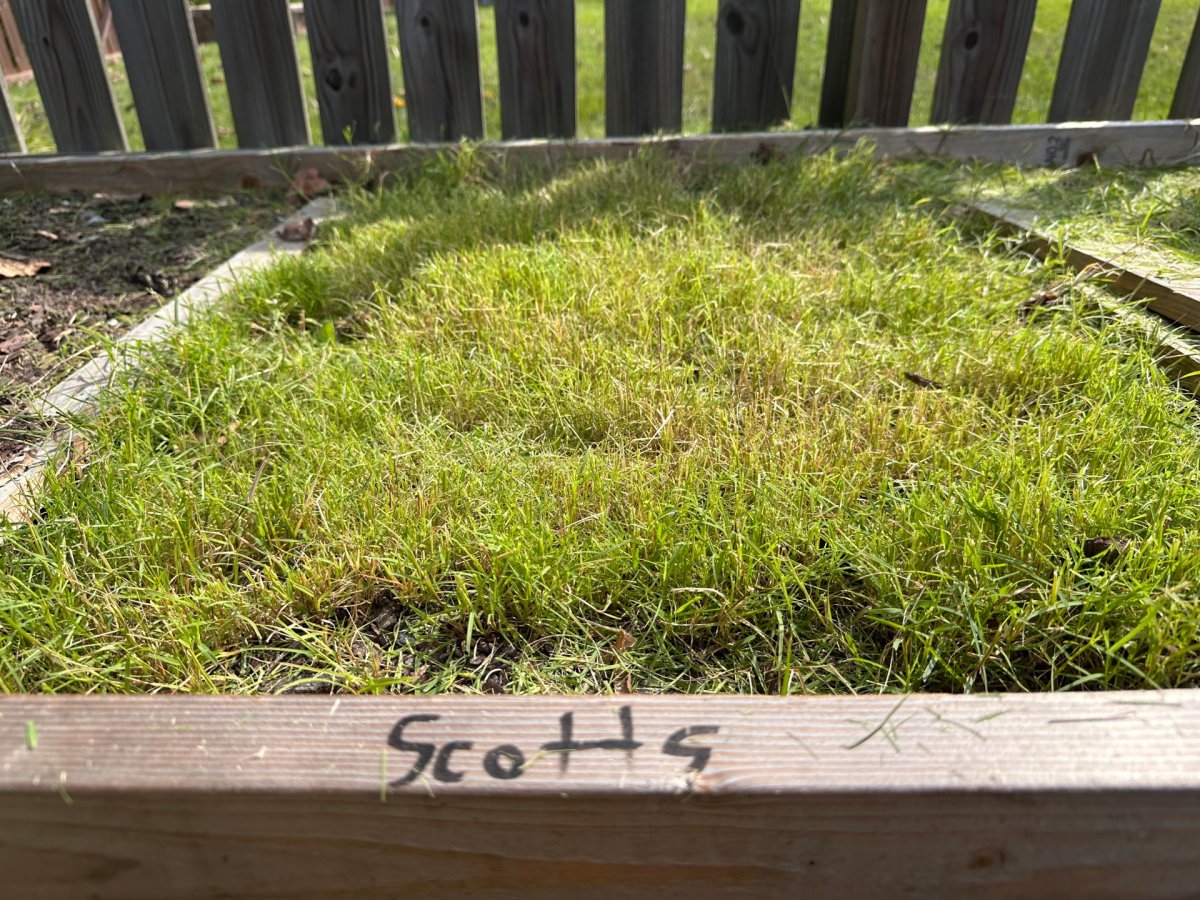
How We Chose and Tested the Best Bermuda Grass Seed
| Products tested | 3 |
| Time spent testing | 2 months |
| Tests performed | 1 |
| Price range | $5 to $35 per pound |
A good lawn always starts with high-quality seeds. Through product research and consulting consumer reviews, we chose seed products that are reliable and easy to grow.
We noted coverage area, germination time, and maintenance expectations. Most homeowners want a beautiful lawn relatively quickly, so we chose hulled seeds. Many of the products we chose have beneficial coatings, which give gardeners the satisfaction of fast germination plus the benefits of the added coating, such as better water retention, disease resistance, and added nutrients for growth. To ensure good coverage and satisfaction year-round, we included various grass types and blends, giving more color, texture, and growing time flexibility.
After choosing five Bermuda grass seed products, we subjected three to a series of tests. We created three separate 15 square foot beds, which we filled with several square yards of top soil treated with a grass seed fertilizer mix. After seeding each section based on each product’s respective application guidelines, we watered the plots regularly. Over the course of our testing, we monitored how quickly the grass grew and how well it filled in its respective plot. At the end of the test period, we scored each grass seed for germination success rate, thickness, and how evenly it covered the plot.
| Product | Germination rate | Growth | Value | ||
| Scotts Turf Builder Grass Seed Bermudagrass | 4.5/5 | 5/5 | 5/5 | ||
| Pennington Smart Seed Bermuda Seed and Fertilizer | 1/5 | 1/5 | 1/5 | ||
| Outsidepride Full House Bermuda Grass Seed Blend | 3.5/5 | 3/5 | 2.8/5 |
What to Consider When Choosing Bermuda Grass Seed
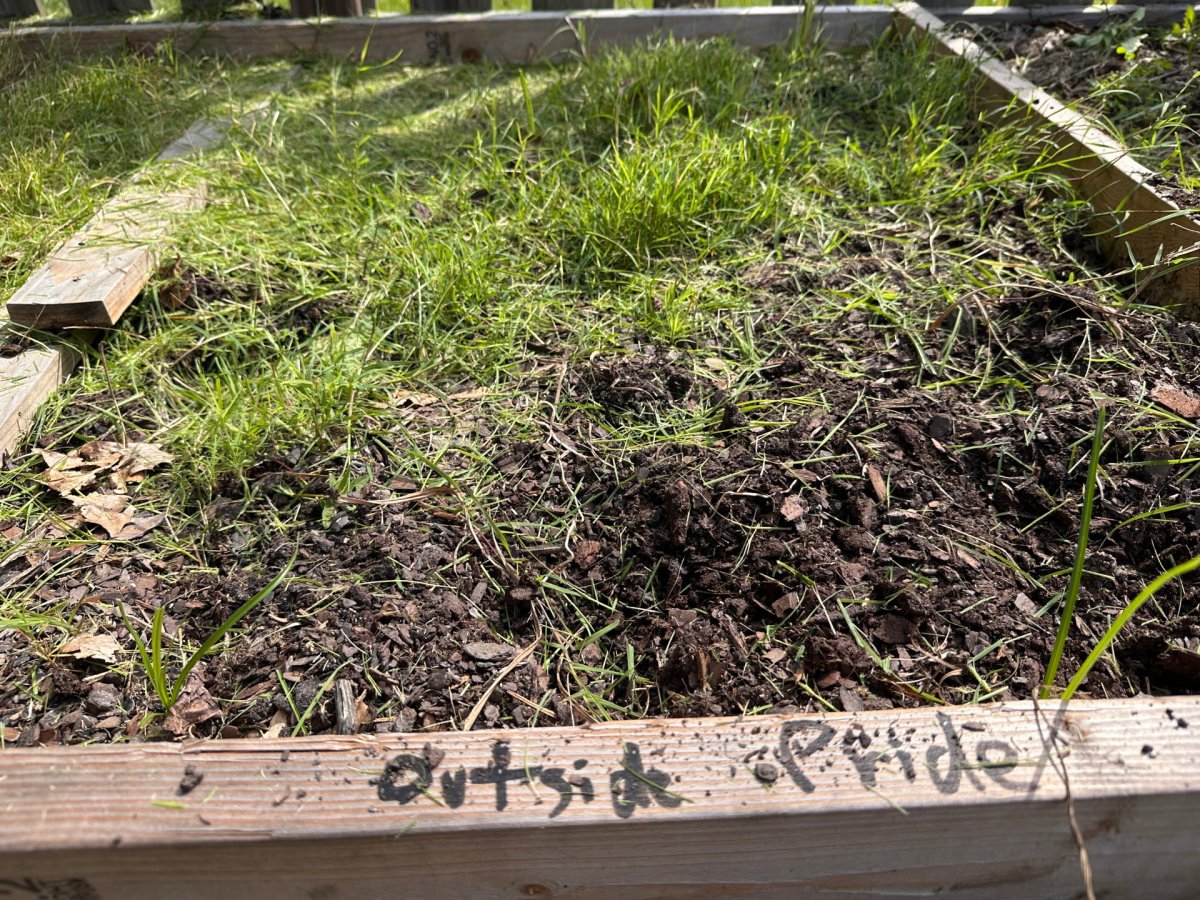
There are several factors to consider when seeding a new lawn. When choosing a new grass seed, consider aesthetics, texture, and stress resistance. Your geographic zone, lawn location and usage, desired germination time, and desired color and texture can all influence your choice of Bermuda grass seed.
Types of Bermuda Grass
There are many types of Bermuda grass, and different varieties can have distinct features, like texture, color, and levels of tolerance to stressors. Many seed bags don’t display the specific Bermuda grass type, but it is beneficial to know the difference between the two main categories: seeded and hybrid Bermuda grasses.
Seeded
Seeded Bermuda grasses include those typically grown from seeds. Growing Bermuda grass from seed is cheaper, offers plenty of grass type choices, and is less labor-intensive to install.
There are several seeded Bermuda grass varieties, including the commonly used, original seed types, aptly named the common Bermuda grasses. These grasses are among the most popular turf grasses used in the southern United States since they are attractive, low-maintenance, and tolerant of drought and foot traffic.
In general, common Bermuda grasses can pretty easily bounce back from a range of stressors, including heat, traffic, drought, and sea salt spray. But if you’re looking for a grass with specific traits, consider a hybrid grass.
Hybrid
Hybrid Bermuda grasses are a mix of common Bermuda grass and another type of grass. These hybrid grasses are almost entirely sold as sod rather than seed.
Hybrid Bermuda grasses are created to blend the desired traits of certain grass types. Desired traits can include better tolerance against disease, pests, and traffic, or better shade tolerance. Hybrid Bermuda seed may also help achieve a certain color or texture.
Installing sod is generally more expensive and time-intensive than seeding. Hybrid Bermuda grasses are often chosen for their superior characteristics. However, that can also come at a price, so they’re generally used for golf courses, turfs, and landscaping rather than by homeowners looking to sow their own lawn.
Popular Bermuda Varieties
Popular common and improved common Bermuda grass seed varieties include Blackjack, Ormond, Oasis blend, Yuma, and Sahara grass. “Improved” common Bermuda grasses were created to enhance some traits of common Bermuda grass varieties. Improved common Bermuda grasses may offer a deeper color, deeper roots, or more desirable texture and density.
Blackjack Bermuda seeds grow a vigorous, deep green grass with a very fine texture. These qualities make it one of the top Bermuda grasses for a carpet-like, dense lawn. Ormond grass is more blue-green in color with a medium texture, often chosen for golf courses and turf fields for its tolerability.
Oasis blend, Yuma, and Sahara varieties are also commonly found in golf courses, fields, and parks. Oasis blend grass grows rapidly (ideal for those who want their lawn to sprout quickly) and is easy to maintain, while Yuma and Sahara grasses create lovely dense deep green turf.
Princess 77 Bermuda grass (later replaced with the Arden 15 Bermuda grass, now itself discontinued) is one of the finest-textured Bermuda grasses available. Some consider it an improved common variety, while others consider it a hybrid type. This grass is ideal for homeowners looking for a more sophisticated-looking lawn, compared to other Bermuda grass species that are often chosen for their tolerability.
Geographic Zone
Grasses are divided into two categories: cool-season and warm-season grasses. Bermuda grass is one of the most common warm-season grasses.
As their name suggests, warm-season grasses endure hot summer months, making them ideal for the southern United States. Bermuda grass can tolerate hot sun and grows well in hot, humid, and even arid climates, which is why summer is Bermuda grass growing season.
Homes north of these states should opt for a different grass type (for example, fescue grass or Kentucky bluegrass). Bermuda grass does not do well in cooler temperatures, and maintaining a Bermuda grass lawn in a cooler zone can be difficult and costly.
Germination Time
Many Bermuda grass seeds on the market are hulled and coated. This means the natural protective layer of the Bermuda seed has been removed and a coating has been added, resulting in a faster germination process. The coating can also aid in fertilizing new growth or promoting better water absorption.
Germination time can vary from brand to brand, and some manufacturers use their special coatings to speed up germination. Manufacturers often display the germination time on the label. Germination time usually ranges from 7 to 21 days, and shoppers should choose depending on how quickly they want their lawn to grow.
Color and Texture
A well-maintained Bermuda grass lawn adds instant curb appeal. Bermuda grass is a popular choice for residential lawns due to its rich green color and medium-to-fine texture. Besides looking nice, it also feels pleasant to walk and play on.
Color and texture can vary depending on the grass variety and grass seed brand. Since many commercially available Bermuda seeds don’t share the grass variety, it can be hard to tell the exact color and texture. Read product descriptions and consumer reviews to get a better idea of how the grass will look once cultivated.
Keep in mind that Bermuda grass becomes dormant and turns brown or yellow when the weather cools. If you’re wondering how to get Bermuda grass to fill in or to cover brown areas, consider overseeding your lawn. Overseeding Bermuda grass lawns with another grass type (like ryegrass) is one way to achieve a greener lawn year-round. In the summer, well-maintained Bermuda grass lawns will reward homeowners with a lush green color.
Amount of Shade
Bermuda grass is a hardy grass type that can tolerate poor soil conditions and recover quickly from damage. However, there’s one thing in particular Bermuda grass lawns need: sunlight.
This naturally heat- and drought-resistant grass is a sun-loving plant that does not do well in shady areas. Consider how much sunshine your desired planting area receives during the day. Bermuda grass grows best in areas that receive at least 4 hours of full, direct sunlight daily, but 8 hours is usually better.
Planting Bermuda grass seeds in a shady area is a recipe for frustration. For shady lawns, consider a different grass type or a Bermuda grass blend that incorporates a shade-tolerant grass. Shade-tolerant grasses can help fill in areas where Bermuda grasses may falter.
Foot Traffic
Some grasses are sensitive to foot traffic, but fortunately, Bermuda grass is not one of them. Bermuda grass is one of the most tolerant grasses when it comes to daily usage. This is one of several factors that make it a popular choice for residential lawns.
Bermuda grass is a low-growing grass with a tougher texture. It can grow an extensive root system, which allows it to withstand traffic from playing children and pets, outdoor parties, and daily wear and tear. This grass type holds up well to constant use, which is what makes it a suitable choice for public spaces as well as residential lawns.
FAQs
With the right seed and proper maintenance, you can sow a beautiful lawn worth talking about. Still considering which is the best Bermuda grass seed for your lawn? Read on for some frequently asked questions about choosing and growing Bermuda grass seeds for lawn care.
Choose a Bermuda grass type depending on your desired look, texture, and durability. Also, consider if you want to plant seeds or lay down sod, and think about the cost and process of sowing Bermuda grass seed.
Bermuda grass needs well-draining soil. In areas with clay soils (which generally have poor drainage), adding sand to the soil can help improve drainage.
Yes, Bermuda grass can be used to overseed lawns.
Since Bermuda grass is a perennial grass, reseeding is not usually necessary.
While Bermuda grass grows aggressively and can choke out some weeds, your lawn will still benefit from additional weed control measures to keep it weed-free.
Using a slow-release nitrogen fertilizer can help grass growth and make your Bermuda grass lawn thicker.
Meet the Tester
Tony Carrick is a freelance writer specializing in home improvement, landscaping, technology, home security, and design. His articles have been featured on such sites as Popular Mechanics, Futurism, SFGate, Pro Tools Review, and more.
Additional research provided by Jasmine Harding.

The post A Familiar Name Aced Our Test of the Top Bermuda Grass Seeds appeared first on Bob Vila.
